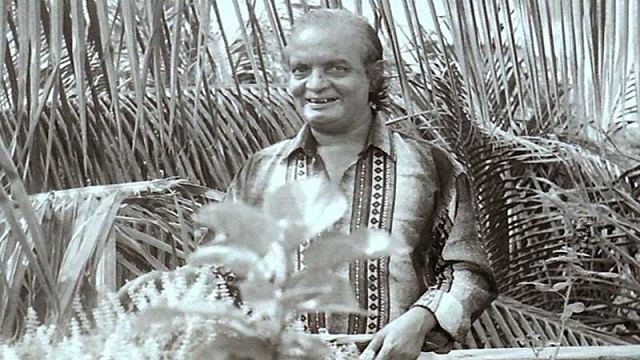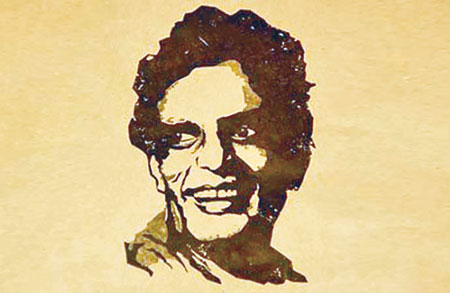A writer with great conviction and commitment
Published:
2021-07-01 03:28:54 BdST
Update:
2024-04-25 23:06:18 BdST

Ariful Islam Laskar: It is too difficult to evaluate the writings of a person of such a vast caliber in a short piece of write-up. Readers must encounter the original writings of the writer to taste and understand his thoughts and philosophies. Any shortcut cannot be an alternative. However, this article is nothing but a tribute and birthday (30 June 1943) offering to an outspoken novelist, essayist, poet, and translator Ahmed Sofa who did not compromise with the oppressive and evil forces of our society.
His groundbreaking original essays energize me to realize and think differently, and his novels help me see our society, culture, and politics from many diverse angles and perspectives. What surprises me the most is his spontaneity in writing even though he deals with sophisticated and sensitive matters relating to religion, politics, and the formation of a nation and nationhood. His dictions are lucid, sentences are relatively short, and every paragraph gives fresh ideas and sensation. It seems like me that Sofa is reading me a story in an easy and capitative mood. His Writings are easily accessible, yet all his sentences induce the readers to stop and contemplate.
The first novel that caught my imagination and changed my view about writing a novel is Sofa's Omkar (the Om, 1975). Here I find an original writer who is articulating every word eloquently and sentence effortlessly. Then I read Surjo Tumi Sathi (Sun, You are My Companion). This book which Sofa considers his best one reveals the life of the easy-going oppressed village people who are the constant prey of natural calamity and village matubbar. However, as a reader, I am so impressed by the way Sofa portrays the dauntless village people who protest, forget the religious barrier, and enquires about daring questions about religious identity.
The novel that immensely touched me is 'Gavi Bittanto'. I literally could not move away from it while reading. The novel humorously presents how university teachers skip teaching and intellectual practice and exercises political power in the university. To my utter surprise, I see, even in this 2021 Bangladeshi teachers are busy gaining political and administrative power. Teachers and vice-chancellors do not inculcate intellectual endeavor and involve themselves more in non-academic profit-making ventures.
From his young life, Ahmed Sofa was involved with politics. But he was a free thinker and never biased in his writing in every sphere of life. We find his simple but fearless nature of life reflected in each piece of his writings. He was not a follower of a trend rather he was a trendsetter. In this case, to me, Sofa's essays are more revolutionary, radical, and very deep-seated than his novels. His arguments, sharp-razor thoughts, and his historical and political sense make Sofa a unique Bengali essayist ever born in Bangla literature.
His Buddhibrittir Natun Binyas (A New Mode of Intellectualism, 1972) and 'BangaliMusalmaner Man' (The Mind of the Bengali Muslims, 1981) took me into an ocean of deep thinking. Every single sentence seemed important to me. I must confess that these two writings and other essays of Sofa still influence me and shape my thought.
The long and intricate 'Bangali Musalmaner Man' essay unfolds a new identity in me. As 'Musalmaner Sontan' I asked a lot of questions to my inner self while negotiating my thoughts with this exclusive writing. Sofa plainly writes that, to my understanding, Bengali Muslims are afraid of free-thinking. They have made them incapable of making their destiny. But he did not solely blame the Muslims at all instead he argues that for a long time they have gone through a conventional and manipulative historical process that has shaped their minds. Yet, Sofa invites the Bengali Muslims to listen to their hearts and not to blame others for their downfall. He further suggests they to follow the augmented domain of science, culture, and literature.

Ahmed Sofa: A writer with great conviction and commitment
In his essay 'Bangladesher Uchubitto Sreniebong Somajbiplob Proshongo'(On the Issue of Elite Class of Bangladesh and Social Struggle) impressed me. The sentence that stirs my thought is 'the elites of Bangladesh pretend more foreign than the foreigners. He clearly and logically reveals that the backwardness of the Bengali Muslims is not because that they are Muslims but because the elites keep their distance from the subalterns and subjugate them. Consequently, these oppressed people feel alienated and do not feel true belonging to anything in Bangladesh. Reading this essay, I keenly observe the sublimity and subtlety of Ahmed Sofa as a thinker and essayist.
In most of his essays, he talked about Bengali nationality and identity formation. No wonder, he wrote extensively about politics and culture that shape the identity of people. He was always concerned about identity politics and its impact on our psyche. Sofa was an accomplished literary critic nonetheless he preferred to write creative pieces. Unlike many famous writers, he was not an armchair literary figure; he was very active in meetings, road marches, and literary forums. He was up against all sorts of oppressions- be it physical or psychological.
Though I haven't read much of his poems, I find his poetry interesting and ingenious. It is not possible to capture the journey of Ahmed Sofa as a writer. Because of the space limit, I could not write everything that I have studied about great Sofa. But, from my limited reading of Sofa, I dare to say that he is unlike than most of the Bangladeshi writers. His boldness and courage make him different. He loved to declare his descendants from a farmer family. Every stroke of his pen is a stroke of confidence. To me, Sofa means historical sense, revolution, and creation.
I must say that reading Sofa is a must. Our old scholars have neglected him a lot. The young budding scholars and a truly sensitive and revolutionary soul who loves to see a secular and developed Bangladesh must go through his writings. Avoiding Sofa means neglecting the original history of Bangladesh and one's own identity. So far, as a young reader of Sofa, I trust his writings the most than any other writer in Bangladesh.
The writer teaches English Literature at a private university.
Dhaka, 30 June (campuslive24.com)//AIT
Topic:



Share Your Valuable Comments: